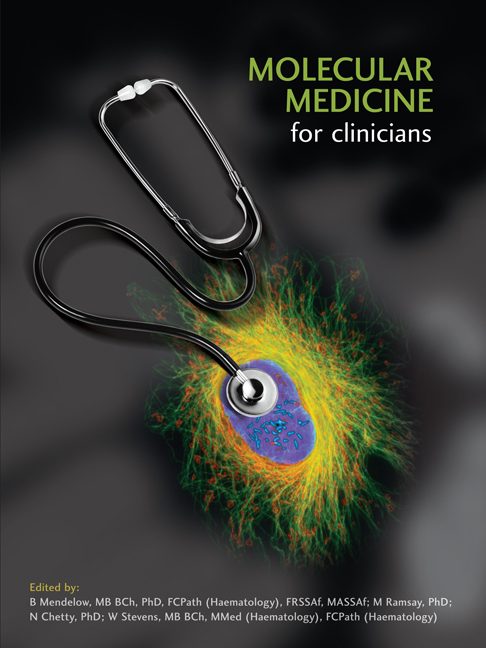Book contents
- Frontmatter
- Contents
- Foreword
- Acknowledgements
- Chapter 1 Introduction
- Keynote Essay 1: Defining Who We Are: DNA in Forensics, Genealogy and Human Origins
- Section 1 Principles Of Cellular And Molecular Biology
- SECTION 2 MOLECULAR PATHOLOGY
- Chapter 8 Genomes and the Environment: An Overview of Molecular Pathology
- Chapter 9 Genetics, Genomics, Health and Disease: General Considerations
- Chapter 10 Chromosome Disorders
- Chapter 11 Mendelian Inheritance
- Chapter 12 Unusual Molecular Processes that Impact on Disease
- Chapter 13 Population Genetics
- Chapter 14 Complex Multifactorial Inheritance
- Chapter 15 Molecular Basis for Phenotypic Variation
- Chapter 16 Medical Genetics
- Keynote Essay 3: Human Cloning: Should We Go There?
- Chapter 17 Neoplasia: General Considerations
- Chapter 18 Oncogenes
- Chapter 19 Mammalian DNA Repair
- Chapter 20 Tumour Suppressor Genes and Inherited Susceptibility to Cancer
- Chapter 21 Carcinoma
- Chapter 22 Leukaemias and Lymphomas
- Chapter 23 Molecular Approaches to the Diagnosis, Prognostication and Monitoring of Cancer
- Keynote Essay 4: Microbes, Molecules, Maladies and Man
- Chapter 24 Molecular Basis of Infectious Diseases: General Considerations
- Chapter 25 Immunology
- Chapter 26 Human Immunodeficiency Virus
- Chapter 27 Tuberculosis
- Chapter 28 Malaria
- Chapter 29 Influenza
- Chapter 30 Oncogenic Viruses
- Chapter 31 Vaccines and Immunisation
- Keynote Essay 5: Drugs and the 21st Century
- SECTION 3 MOLECULAR THERAPEUTICS
- SECTION 4 RESEARCH AND THE CONTINUING EVOLUTION OF MOLECULAR MEDICINE
- Glossary
- Contributors’ Biographies
- Source Material And Recommended Reading
- Permissions And Credits
- Index
Chapter 18 - Oncogenes
from SECTION 2 - MOLECULAR PATHOLOGY
Published online by Cambridge University Press: 04 June 2019
- Frontmatter
- Contents
- Foreword
- Acknowledgements
- Chapter 1 Introduction
- Keynote Essay 1: Defining Who We Are: DNA in Forensics, Genealogy and Human Origins
- Section 1 Principles Of Cellular And Molecular Biology
- SECTION 2 MOLECULAR PATHOLOGY
- Chapter 8 Genomes and the Environment: An Overview of Molecular Pathology
- Chapter 9 Genetics, Genomics, Health and Disease: General Considerations
- Chapter 10 Chromosome Disorders
- Chapter 11 Mendelian Inheritance
- Chapter 12 Unusual Molecular Processes that Impact on Disease
- Chapter 13 Population Genetics
- Chapter 14 Complex Multifactorial Inheritance
- Chapter 15 Molecular Basis for Phenotypic Variation
- Chapter 16 Medical Genetics
- Keynote Essay 3: Human Cloning: Should We Go There?
- Chapter 17 Neoplasia: General Considerations
- Chapter 18 Oncogenes
- Chapter 19 Mammalian DNA Repair
- Chapter 20 Tumour Suppressor Genes and Inherited Susceptibility to Cancer
- Chapter 21 Carcinoma
- Chapter 22 Leukaemias and Lymphomas
- Chapter 23 Molecular Approaches to the Diagnosis, Prognostication and Monitoring of Cancer
- Keynote Essay 4: Microbes, Molecules, Maladies and Man
- Chapter 24 Molecular Basis of Infectious Diseases: General Considerations
- Chapter 25 Immunology
- Chapter 26 Human Immunodeficiency Virus
- Chapter 27 Tuberculosis
- Chapter 28 Malaria
- Chapter 29 Influenza
- Chapter 30 Oncogenic Viruses
- Chapter 31 Vaccines and Immunisation
- Keynote Essay 5: Drugs and the 21st Century
- SECTION 3 MOLECULAR THERAPEUTICS
- SECTION 4 RESEARCH AND THE CONTINUING EVOLUTION OF MOLECULAR MEDICINE
- Glossary
- Contributors’ Biographies
- Source Material And Recommended Reading
- Permissions And Credits
- Index
Summary
INTRODUCTION
The cell is a complex array of networks – a protein communication system, with phosphorylation cascades transmitting messages from receptors at the surface to the nucleus. Individual proteins integrate signals from a diversity of activator molecules, transducing them through intracellular signalling pathways to various target or effector proteins. Circuits of this nature enable a cell to respond to external factors and to modify its own function. In particular, in this chapter we will look at the way in which growth factors and hormones regulate the processes of cell division and differentiation, and cell survival.
Proto-oncogenes have been identified as genes encoding protein members of cascades dedicated to the transmission of signals regulating growth and survival. The actions of proto-oncogene-encoded proteins are tightly controlled under normal circum stances. If such proteins are abnormal, or if there is too much of them, signals are deregulated, downstream transducing molecules are activated and there is excessive stimulation of cell growth and survival. When intracellular signal pathways are out of control, a cell may begin to multiply unceasingly in a way that can lead to cancer.
We define a proto-oncogene as the form the gene takes as it carries out its usual functions within a cell – it has the potential to become an oncogene. Proto-oncogenes may also be referred to as cellular oncogenes (conc). An oncogene is a mutated form of a proto-oncogene producing a protein, which stimulates uncontrolled growth and promotes cell survival. The homologous counterparts of certain oncogenes occur in retroviruses; these are viral oncogenes (v-onc). Oncogenes are dominant in the sense that only one allele needs to be mutated to cause cancer.
Many of the human oncogenes were discovered through the study of animal retro - viruses, acutely transforming RNA tumour viruses, whose genomes are reverse transcribed into DNA in infected cells. During the course of infection, retroviral DNA is inserted into the chromosomes of host cells. The retro viral oncogenes are derived from the normal cellular genes of the host which have been incorporated into the retroviral genome. In 1970, the first oncogene, now known as the SRC oncogene, was identified in a chicken tumour virus.
- Type
- Chapter
- Information
- Molecular Medicine for Clinicians , pp. 218 - 226Publisher: Wits University PressPrint publication year: 2008



